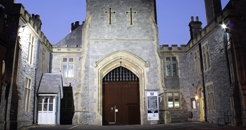 1000+ facts about the prison system
1000+ facts about the prison system
From a report by Prison Reform Trust
This week is Prisons' Week and I thought I would dig into facts about our prison system.
Prison Reform Trust produced a fact file about prisons in England & Wales, Scotland and Northern Ireland in autumn 2015. It contains a huge number of insights and would inform prayer and other initiatives. An updated shorter version was produced in summer 2016.
It is difficult to know what facts to pick out. For this article, I will focus on the social characteristics of adult prisoners (in this case in England and Wales) as this gives an insight as to both prevention and restoration initiatives that a church may want to explore.
|
Characteristic |
Prison population |
General population |
|
Taken into care as a child |
24%
(31% for women, 24% for men) |
2% |
|
Experienced abuse as a child |
29%
(53% for women, 27% for men) |
20% |
|
Observed violence in the home as a child |
41%
(50% for women, 40% for men) |
14% |
|
Regularly truant from school |
59% |
5.2% (England) and 4.8% (Wales) |
|
Expelled or permanently excluded from school |
42%
(32% for women, 43% for men) |
In 2005 >1% of school pupils were permanently excluded (England) |
|
No qualifications |
47% |
15% of working age population |
|
Unemployed in the four weeks before custody |
68%
(81% for women, 67% for men) |
7.7% of the economically active population are unemployed |
|
Never had a job |
13% |
3.9% |
|
Homeless before entering custody |
15% |
4% have been homeless or in
temporary accommodation |
|
Have children under the age of 18 |
54% |
Approximately 27% of the over 18 population |
|
Are young fathers (aged 18–20) |
19% |
4% |
|
Have symptoms indicative of psychosis |
16%
(25% for women, 15% for men) |
4% |
Identified as suffering from
both anxiety and depression |
25%
(49% for women, 23% for men) |
15% |
Have attempted suicide at
some point |
46% for women, 21% for men |
6% |
|
Have ever used Class A drugs |
64% |
13% |
Drank alcohol every day in the
four weeks before custody |
22% |
16% of men and 10% of women reported drinking on a daily basis |
The above statistics reinforce the effect of Adverse Childhood Experiences (ACEs). The stress of severe and chronic childhood trauma releases toxic stress hormones that physically damage a child’s developing brain. Children with toxic stress live much of their lives in fight, flight or fright (freeze) mode. They respond to the world as a place of constant danger. With their brains overloaded with stress hormones and unable to function appropriately, they can’t focus on learning. They fall behind in school or fail to develop healthy relationships with peers or create problems with teachers and principals because they are unable to trust adults. Some kids do all three. With despair, guilt and frustration pecking away at their psyches, they often find solace in food, alcohol, tobacco, methamphetamine, inappropriate sex, high-risk sports, and/or work and over-achievement.
Thinking about prevention, our work with the community, parents and children is fundamental, especially helping them to be trauma-informed. Options for these are covered in the following articles:
How a community becomes trauma-informed
11 resources for parenting - families and early years
6 resources to help relationships - families and early years
6 resources to help with education
What about restoration?
There are a number of initiatives churches are involved in, These mostly cover addiction, homelessness and life skills e.g. literacy.
Some of the organisations that can help equip are:
Clean Sheet
Hope into Action
CAP Job Clubs
Living Recovery
Retweet about this article:
From a report by The Prison Reform Trust, 11/10/2016